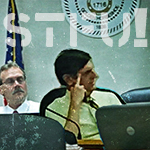 Citizens in Greene County are rightfully apprehensive about draconian new controls over public comment at Board of Supervisors’ meetings. Championed by Board Chair, David Cox, the restrictions were imposed by the Board on July 28 in a 4-1 vote, with only Supervisor Eddie Deane opposing.
Citizens in Greene County are rightfully apprehensive about draconian new controls over public comment at Board of Supervisors’ meetings. Championed by Board Chair, David Cox, the restrictions were imposed by the Board on July 28 in a 4-1 vote, with only Supervisor Eddie Deane opposing.
Citing constitutional issues, elements of Greene’s public speech code have drawn scorn from John Whitehead, renowned civil liberties attorney and founder of the Rutherford Institute. Whitehead’s concerns and comments appear below in their entirety:
“Any person desiring to speak shall sign up prior to the meeting and write down the subject of their comments. The Chair will decide whether the comments will be heard.” This rule appears to grant unfettered discretion to the Chair to determine whether a person will be allowed to speak in the open comment period and opens the door to viewpoint discrimination. There is another rule requiring “[c]omments must be directly related to the services, programs or policies of the County,” which seems is likely a valid restriction, and to the extent the Chair only applies this limitation, there may not be a problem. But the bolded language is not clearly limited in this respect and gives the Chair extremely broad authority that is contrary to First Amendment principles.
The rules also provide that the comments must only be addressed to the Chair of the Board. This also seems overly restrictive and not necessary to keep the public comments pertinent to County business and within the bounds of decorum. A speaker might have a particular issue with the official conduct/vote of a particular member and desire to raise that with that member. While it certainly could be done by only addressing the Chair, there does not seem to be any particular reason to prohibit addressing a different member or members.
“No citizen shall speak on any matter of business that is a subject on the board’s agenda for that meeting.” This is a restriction on subject matter, and such restrictions are generally allowable in the public meeting context. For example, a public body is not required to allow a person to speak on the Iran nuclear deal at a meeting concerning local zoning matters. However, it seems strange that the Board would restrict comments on something that is allegedly part of the Board’s business, but the idea here may be that the agenda item has already been given sufficient discussion time and the public comment period should be reserved for other issues that might not otherwise get airing.
The new rules also forbid addressing staff in a “disrespectful” manner or making “personal attacks or accusations” against others. This could be deemed a form of viewpoint discrimination, since comments which praise or commend Board members or staff are not prohibited, but those comments criticizing them might be deemed personal attacks. However, the Fourth Circuit Court of Appeals held (in a case we later handled on a petition for certiorari) that a content-neutral policy against personal attacks is not facially unconstitutional if adopted and employed to serve the interests of maintaining order and decorum. However, that same court also recognized that such a policy may not be misused to chill or suppress speech of legitimate relevance to a public meeting.
“Any person who does not follow the rules listed above will be directed by the Chair to end their comments immediately and will not be allowed to comment at the next scheduled meeting of the Board of Supervisors. If necessary, speakers may be removed from the room if violations of the rule above persist.” This rule is draconian and a better policy would be to have the Chair advise the speaker of the rule he/she is running afoul of and ask them to limit their comments accordingly. It also seems severe to ban the person from speaking at the next meeting and it raises constitutional issues as well.







[…] Eddie Deane, in calling for the rescission of draconian new public speech rules, which have drawn ire and outrage from citizens and observers […]